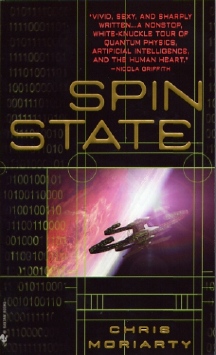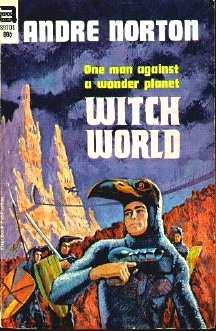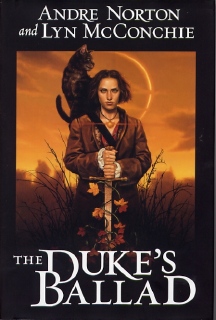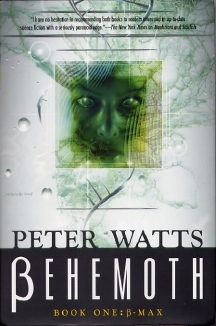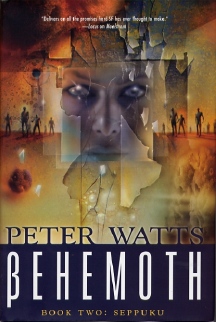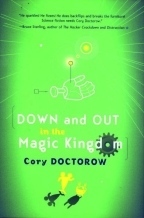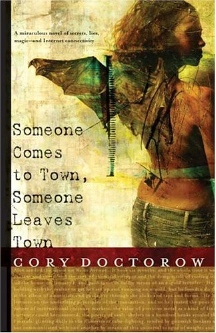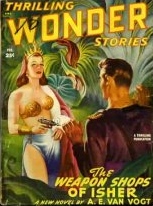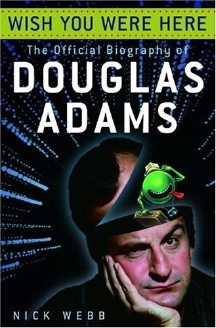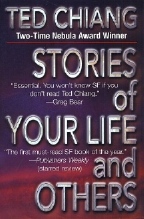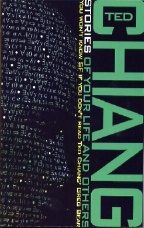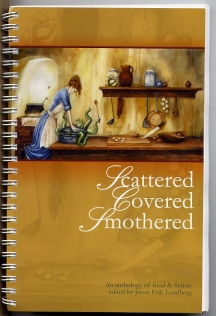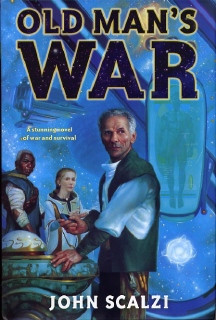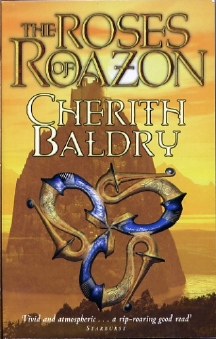|
|
|
This Just In...News from the Agony Column
|
01-07-05: Chris Moriarty 'Spin State' |
||||||
Hard
Science and Easy Reading
For Chris Moriarty and 'Spin State', the Philip K. Dick award strategy worked out -- it was a finalist in 2003, upon its original release. It's funny how many worthwhile books there are out there that can skate by if you're not looking closely. It's nearly as inscrutable as the institutions our science fiction writers choose to keep alive in the far futures they create. For Chris Moriarty and Charles Stross share another similarity; both have created main characters in a far-flung universe (where humans pop about the stars in ships as if they are piloting BMWs from Beverly Hills to Santa Monica) who happen to be -- a UN representative. Now I like the UN and what it represents just fine. But taking it out into space sort of puzzles me. To me, as wonderful as it is, it is just so...Earth. So...terrestrial. My take is that by making their characters UN reps, Stross and Moriarty are making the sort of hopeful statement that the existence of the 'Federation of Planets' in the Star Trek universe makes. There's an "Everything is going to be just fine, at least until this novel starts" feel about that choice. I can live with it, but I do a double take every time I see it. When 'Spin State' starts, UN Peacekeeper Catherine Li is returning home to Compson's World, a mining colony where she'll find her cloned twin and a missing dataset that could upset the balance of power. She rapidly finds herself chasing a killer and in danger of losing her mind, even though she's able to back it up on a hard drive. So, 'Spin State' is clearly a nicely imagined, fast-paced SF adventure. But what makes it more, what makes it fodder for my readers?
But Moriarty's novel comes with seven, count 'em, seven pages of actual science non-fiction references, the type usually found in novels where character and story take a backseat to science and conceptualization. So which type of writer is she, hard or soft SF? And that's where things get fun. Take a look over at her website to find her take on these matters and more. She's got some really interesting insights into this largely false division between "hard" and "soft" science fiction. She's got a few great essays that will have you heading for your bookstore to pick up 'Spin State', hopefully in a state less worn that the first edition I found. Spot the "chickpunk" author you think I would think she should add to her quite excellent and exhaustive list. Benefit from her writing advice, which can be summed up as "Write." Thrill to the mention of her forthcoming sequel to 'Spin State', 'Spin Control'. But mostly, prepare to shell out the money for her novel, because her intelligence and wit are quite obvious. She's clearly a smart and engaging author. And she makes one hell of an argument for buying beat-up and battered books. Because, as finicky as I am about books, in the end, it's the content that matters. It's easy to get yourself in a state about the condition of a book's spine. But it's much smarter to simply get yourself into 'Spin State', and once you achieve it, expect hard science fact to intervene. Get ready for a visit from the law of inertia. If you're a body at rest --reading Moriarty's novel -- you're likely to remain that way. |
|
01-06-04: Andre Norton and Lyn McConchie 'The Duke's Ballad'; Peter Watts 'Behemoth: Seppuku' |
||||||
The
Great Indoctrinator
At that age, I found the book covers and the books themselves pretty scary, and in some cases, deeply disturbing. Norton, who at that time already commanded a huge section of the shelf, was unavoidable, unmissable. And so it was some mumble-mumble years ago that I first encountered 'Witch World'. Now I won't pretend that these books are great literature, because they're not. What they are, however, are great indoctrinators. You may not always read Andre Norton's books, but once you do, you'll always enjoy science fiction and fantasy. There's no doubt about that. While we'd like to believe that everything of interest was recently invented, that's not the case. Almost forty years before hordes of kids were converted into SF&F fans -- and indeed book fans -- by J. K. Rowling, kids like myself were being converted in exactly the same fashion by Andre Norton. Norton brings simple -- but crucial -- pleasures to the forefront to engage the readers.
Moreover, she does so with enough imagination to keep you glued to the page, but not so much as to make you scratch your head. It's a delicate balancing act, but with more than 100 books to her name, one must presume she's remained quite good at it. And the biggest series to her name is 'Witch World'. 'The Duke's Ballad' has all the classic Norton elements. You've got a young heroine, gifted but exiled, now returning to claim her own. A younger sibling to protect. An evil relative to displace. And 318 pages to get the job done. Helping Norton -- who is, after all, 83 years old next month -- is Lyn McConchie. She's worked with Norton on numerous 'Witch World' sequels, while enjoying the delights of living in New Zealand. Nice work if you can get it! And if you can't, you can browse Norton's website to try to get an idea how much work she has done. Alas, while the jacket art of Daniel De Santos is really quite gorgeous, I do have to wonder how it will age. Will the kids of today look at these covers some forty years hence and find themselves pulled helplessly back to the turn of the century? |
||||||
Abandon
All Hope -- Period.
Now I had a column about and an interview with Peter Watts upon the publication of the first half of this book, 'Behemoth: B-Max'. New readers will want to check it out before going much further here, and those who read it may want to glance at it again before going much further. So now a brief moment while you flick back and remember what passed before...
Watts writes with a hallucinating sense of rage, a clarifying feel for vengeance. He has some of the pizzazz of Philip K. Dick, but he fuels his lysergic visions with methamphetamine anger. Reading these books is sort of like being locked in a room with Hannibal Lecter and 500 cups of coffee. It's very scary -- almost to the point where enervation and exhilaration become indistinguishable from one another. Yes, Peter Watts hits high notes that you're just not going to find elsewhere. But there's a price you pay, unless you see it not as a price, but rather, a reward. Look, Peter Watts is going to show you the end of the goddamned world. That's no small deal. Don't think he hopes this kind of scenario is what's going to go down. But he surely is going to make you fear that it could go down. He'll make you think that it's happening right now. But it's not, is it? Is it? |
|
01-05-04: Cory Doctorow's New Novel 'Someone Comes to Town, Someone Leaves Town'; Elizabeth McKenzie's 'Stop That Girl' |
|||||||||||
Urban
Magic and Internet Connectivity
Now however, Doctorow has taken a very different track. His forthcoming novel, 'Someone Comes to Town, Someone Leaves Town' (Tor Books / Tom Doherty Associates ; May 1, 2005 ; $24.95) is in the first place coming to town a bit later in the year. The early draft I first read of this novel was nearly three times as long as 'Eastern Standard Tribe'. But the big ch-ch-ch-changes come as Doctorow turns to face the strangeness not of a science fictional future, but instead a fantastically rendered present. Alan, the protagonist of 'Someone Comes to Town, Someone Leaves Town', is a middle-aged man who moves into a bohemian neighborhood of Toronto. He only barely fits in with the college-roomie types next door, and that's even before the gal who lives there reveals to him that she has wings that grow back even if she cuts 'em off. Alan is a sensitive guy, and he understands, because, we're told, his father is a mountain and his mother is a washing machine. This is clearly the type of reproduction that will not be taught in your hygiene classes. So, you know, when one of his brothers, a set of nested Russian nesting dolls, shows up on his doorstep starving because the innermost doll has disappeared, you can imagine that the whole family relationship issue is a bit more complex than usual. Especially since brother Davey, whom Alan and his other siblings killed years ago, may have returned, bent on revenge.
So with this novel in the can, I wrote Cory and asked him what was coming next. He told me, "I've started work on a new novel, working title, "Themepunks," about a different kind of Singularity: economic Singularity. The action revolves around a radical restructure of corporate America into a kind of microentrepreneurship, where multinationals hire communal teams of 3-5 people to start tiny businesses that operate in a loose network across the nation. The action really starts when this crashes and 20% of America's workforce transitions from wildly creative, entrepreneurial quasi-self-employment to complete economic catastrophe...overnight." So, 20% unemployed almost overnight? Once again Doctorow makes a radical departure...into non-fiction, recent history stuff. Oh my. Or near-future history. For this reader, one of the major jobs of the science fiction writer is to prevent a horrific future by creating it in the present as fiction. So next year we can look forward to Doctorow converting a possible future from potentially unpleasant factuality to certainly enjoyable fiction. A conversion process that yields millions of megawatts of reading energy! |
|||||||||||
From
Fixup to a Novel in Stories
Van Vogt's first fixup was 'The Weapon Shops of Isher' a novel that is at times illogical and other times almost magical in the way reality appears to shift. Other famous science fiction titles that are fixups include Philip Jose Farmer's 'To Your Scattered Bodies Go' (recently filmed by the SciFi Channel as 'Riverworld'), James Gunn's 'The Immortals', 'A World Out of Time' by Larry Niven, and Robert A. Heinlein's 'Orphans in the Sky'. A recent fixup novel I covered -- and one that sounds pretty damn entertaining -- is 'Crux' from Tor by Albert E. Cowdrey. The fixup novel is not nearly so well known in the literary world, and of course, it has a better pedigree. The literary equivalent of 'The Weapon Shops of Isher' is Sherwood Anderson's 'Winesburg Ohio'. With two unsuccessful and now largely forgotten novels behind him, Anderson began to publish in 1919 a series of stories loosely connected because they were all set in the fictional town of Winesburg, Ohio, and each of the characters was afflicted with some aspect of the grotesque. When published together, they caused a huge literary stir. Where in the science fiction world the fixup was the result of economic necessity, the literary world saw 'Winesburg Ohio' as an imaginative innovation in form. The book was an immediate critical success, though Anderson never managed to follow it up with anything that was its equal.
The stories that are threaded together to form 'Stop That Girl' center on the life of Ann Ransom. They start when at the age of eight she's sent to Europe by her pregnant mother, accompanied by her grandmother known even to the family as Dr. Frost. As Ann grows up, we find her in the Grand Canyon in 'We Know Where We Are, But Not Why', and in college as Dr. Frost returns to meet her on the campus of UC Santa Cruz during a visit by Allen Ginsberg ('SOS'). As Ann moves farther from home she inevitably returns to her family and home again. She gets married ('The Possible World') and has children ('Last of Our Tribe'). The short story-novel format enables McKenzie to economically cover a lifetime that might otherwise be, well, less economical. Instead of a novel with highlights, she's written a novel of highlights. By deliberately designing a novel of stories, McKenzie avoids most of the problems associated with fixups. Instead, what readers are given is a very easily read, episodic look at a girl growing up. There is no stitch work required to connect the stories. All McKenzie needs to do is coin a term describing her novel to enter literary history. To my mind, 'A Novel In Stories" is a bit obvious, and more to the point, difficult to spit out. Given the elegance of the language I encountered in 'Stop That Girl', I expect something a little bit classier fixup. Her task is daunting; she's got to fixup the fixup. |
|
01-04-05: 'Wish You Were Here'; Ted Chiang 'Stories of Your Life and Others' |
|||||||
The
Official Biography of Douglas Adams
So we have the upcoming production of the big-screen version of Douglas Adams' 'The Hitchhiker's Guide to the Galaxy' to thank for a number of delightful crumbs trailing in its wake. For example, our PBS station is showing repeats of the original series that debuted on the BBC probably long before many of the movie's potential fans were even born. People love to knock the old BBC science fiction productions like 'Doctor Who' and 'The Hitchhiker's Guide to the Galaxy', because the special effects look rather cheesy compared to today's clinically clean digital special effects. As if that's a bad thing! Hah! Give me an alien that looks like a giant eyeball with a curtain rack hung around its neck any time over a three-d modeled miracle. At least the giant eyeball will get a few good lines! What shines through the BBC Hitchhiker programs is Adams' wit and wisdom. He wrote with both so surely, so capably that his work transcended any cheesiness. More importantly, he also wrote to the medium, so that even with Doctor Who level effects, he could pull off a pretty awesome display as in 'The Pirate Planet', an episode of the show he wrote that takes no prisoners. Adams was funny, yes, but he was also quite wise, which is why he managed to be so funny in the first place. So in addition to a PBS bonanza of 'The Hitchhiker's Guide to the Galaxy' repeats, we also get re-releases of the books and even more interestingly, an authorized biography of the author, 'Wish You Were Here: An Authorized Biography of Douglas Adams' by Nick Webb (Ballantine Books / Random House ; March 29, 2005 ; $25.95). This look at the late author's life was written by the editor who originally commissioned the books over at Pan Macmillan some thirty years ago. Webb remained a friend of Adams up until the end of Adams' life in May of 2001. He's extraordinarily well set to tell the writer's story. Fist published in the UK in 2003, 'Wish You Were Here' talks both about Adams' life of writing and his life outside of writing. As you might imagine, Adams' was quite well off as a result of his bestselling books. Apparently, he wasn't in the least bit embarrassed by it, and spent extravagantly. Writers having money to spend leaves no doubt that this official, authorized biography contains more than a bit of science fiction. A quick reading of the book will lead to the discovery that Webb writes with the same smirking humor that Adams himself specialized in. Here's his description of New York: "The native wit is wonderful, but it's the humor of people under fire. Even buying a sandwich is combat." It's just a quick sampling of what readers can expect to find between the covers. The appeal of Adams' work is about to be proved once again, as it goes up against a legendary foe: Hollowood, which has been known to decimate the works of our greatest writers. For readers, who enjoy the process of reading, the words that follow one another into their brains, Adams was a breath of fresh air, a certified genius. He is after all the guy who said to bring a towel with you anywhere you go. If you've stayed in a hotel lately, you'll have noted their "Blue/Green Planet Policy" of asking you to re-use your towels and help "save the planet." Adams would not only have approved -- he'd have been prepared! |
|||||||
Finally,
Damnit, What Held Me Back?
Well, so what took me so long? Well, some great stuff I just trust my readers will hear about and let it arc across the sky eventually to land in my backyard, after having traveled around the world. In this case literally. Originally published in the US by Tor, the first edition hardcover was the belle of the ball at the 2003 WorldCon. Everyone was talking about it, and I'd be surprised if they weren't making hats of the book for readers to wear in a sort of reading-by-mental-osmosis mode. Chiang won just about every award you can win for the stories within, which run the gamut of subjects from a successful Tower of Babylon that manages to break through to heaven to a discovery that the fundamentals of mathematics we consider to be universal constants are instead inconsistent. So following on Tor's 2002 hardcover, you get a Tor 2003 trade paperback edition via their Orb imprint. Once again, it beams right by. Then you get a Tor UK 2004 trade paperback, which by using stolen Romulan cloaking technology gets away from me in early 2004. Finally, in 2005, a full two and a half years after its original release, the book de-cloaks, and happily -- and not coincidentally, I might add -- I'm a lot more interested in reading short stories. I will add that it was not until I scanned the cover that I noticed the face in the numbers of this UK edition. Even that apparently, though totally obvious, was cloaked. Fortunately of all things one can hide, there's something that never escapes my notice -- the words in the book. |
|
01-03-05: Jason Erik Lundberg 'Scattered Covered Smothered', Cherith Baldry 'The Roses of Roazon' and John Scalzi 'Old Man's War' |
|||||||||
Starting the year out right with selections from the Small Press, US Majors
and UK Imports
This is the beginning of my fourth year at trying to help readers find books worth buying and reading, and I have to admit I'm having one hell of a good time. Mostly what happens is that as one gets despondent, wondering why to carry on, some kind reader will write and get me going forward for another day, another week and now what proves to be another year. Moreover, I get lots of great tips from books and authors who read the column. I've got a three foot stack in the living room to get through, but I wanted to choose today's selection to give reader at least part of an idea of what I'll be covering in the year to come. Alas, as ever this is the kind of biased and tweaked setup you'd expect from me. Let's dip right in to today's must-buy first selection, the absolutely delectable 'Scattered Covered Smothered' (Two Cranes Press ; December 15, 2004 ; $9.99) edited by Jason Erik Lundberg from Two Cranes Press. I first heard about this while poking about one of Jeff VanderMeer's discussion boards. But Jason contacted me and sent me a copy of what could easily be one of the smartest, coolest and best anthologies to show up in 2004. 'Scattered Covered Smothered' is an anthology of "food and fiction" -- a sort of cookbook of short stories with a few recipes laced between and scattered within the fiction. You'll note from the cover scan the gorgeous picture and the ingenious spiral binding. Ingenious because it both mocks a cookbook and offers some very cost-effective small-press publishing. This boils down to: you get a lot for your money. I frankly can't believe that Jason's selling this for ten bucks. You better run to get your copy, because it's surely going to sell out. Buy it from his website directly, or go to your local independent and make them order one up; chances are they'll order more and those who get them will quickly re-stock. But don't think that this is a cheap-out. 'Scattered Covered Smothered' sports a classy design within and the pages are nicely printed. The writers include the ever-entertaining and auto-buy guy Rhys Hughes ('A New Universal History of Infamy' and 'Bouffant Terrible'), speculative fiction poet Bruce Boston, Jeff VanderMeer, Des Lewis and more than I can possibly recount in this article. Accordingly, you'll find a variety of styles within. You'll find prose-poetry reminiscent of classic Clark Ashton Smith in 'The Cockaigne Poet Speaks to the Lackey King' by Toiya Kristen Finley. Rhys Hughes chimes in with a number of entertaining poems. There's oddball short speculative fiction -- horror, humor, science fiction and surreal weirdness, exemplified by 'The Apocalypse and Then Oyster Loaf' by Kevin James Miller, 'How to Cure an Iron Skillet' by Luna Black and 'Mallory's Quick-Quick Seduction Cookies' by Mark Teppo. And of course, there are recipes both serious -- 'Prune Chicken' by Elizabeth a Jasper and not-so-serious -- 'Bitter Pudding: A Recipe for Women' by Dominick Cancilla. I suspect that most of my readers who even think they might be interested in such an item will find themselves utterly thrilled with the actual book. This is one of those rockin' really weird Rick-books that you simply must run out and buy. Wave it in the face of your roommate/partner/significant other/co-workers. Buy two and wear one like a hat. It's that's good. And lo-cal! Now I asked Jason to let me know if he should ever do an anthology about vacuuming, as I'm quite an ace with our cheapo vacuum. And just like food, vacuum is such an allegory magnet that one need only mention the word to have stories start popping up everywhere.
The deal in Scalzi's novel is that they're looking for a few good and experienced men. And if you're old and in the way, they'll give you ticket off-earth to fight a bunch of nasty aliens. A one-way ticket, that is, which doesn't bode well. As for the novel, one hopes that Scalzi actually deals with some of the physical issues of getting old, and doesn't just get his space geezers out there and overhaul 'em so they're suddenly buff, butt-kicking rejuvenated frat boys. Scalzi's track record is pretty great. He's the author of some non-fiction that recommends itself by virtue of its title, to wit, 'The Book of the Dumb' and 'The Book of the Dumb 2'. Well of course there had to be a sequel. He's already got a sequel to 'Old Man's War' lined up over at Tor, and given that the novel is only 300 or so pages, that's a welcome sign. I plan on hitting this one ASAP and seeing what Scalzi does with this intriguing premise. And readers should consider shelling out the dough for a first novel that takes a chance or two. You do want new writers to keep appearing on the horizon, dont you?
Of course, these three books only offer a small glimpse of the kind of stuff that I'm going to cover this year, along with giving away more books, if I can possibly swing it. In fact, I've got some outstandingly stellar titles sitting on the shelves, waiting to be read and written about. You can probably buy any or all of these now, and should. By the time they arrive in your hands, I'll have far too many choices for you. Read daily, buy daily, and read here at least five days a week to find out how to make your money disappear as effectively as I have. But don't make my mistake and tell those you know that your slogan for this year is "Penniless But Well Read". This is one of the few times -- in this column -- where actions are more important than words! |
